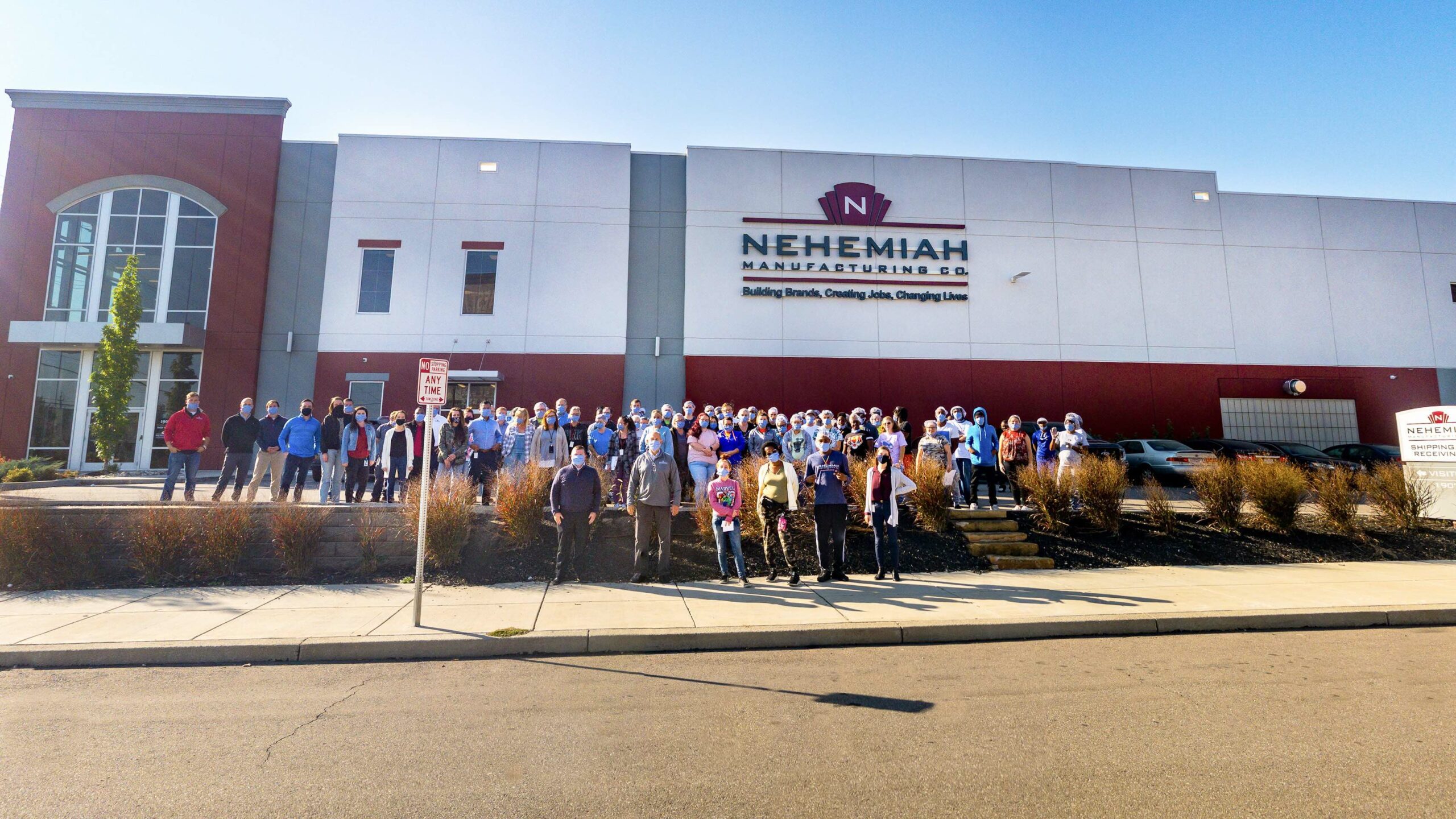The growing labor shortage in U.S. manufacturing is pushing many organizations into a recruiting frenzy. U.S. manufacturers say finding the right talent is now 36 percent harder than it was in 2018 and 77 percent expect to have ongoing difficulties attracting and retaining workers in 2021 and beyond.
Yet amid this labor crisis, a company called Nehemiah Manufacturing has more applicants than it can handle, even as it navigates a Pandemic-driven business boon.

The 12-year-old manufacturing company produces consumer products for global brands that have a smaller market share, including Downy dryer balls, Dreft cleaning products and Tide washing machine cleaner. Nehemiah started with five people in 2009 and now has nearly 200 employees.
While most of Nehemiah’s competitors struggle with up to a 100 percent annual turnover rate, Nehemiah’s turnover hovers around 15 percent, says Eric Wellinghoff, CMO. “Most of our employees have been here for more than five years,” he says. That not only lowers recruiting costs; it also has a huge positive impact on performance and customer satisfaction. “We see a 40 percent improvement in efficiency per employee after three months on the job,” he says. “So, imagine how efficient they are after five-and-a-half years.”
Their secret to success is that the company almost exclusively hires ex-cons.
Hope for the future

Nehemiah Co-Founder and CEO Dan Meyer started the company with a goal to bring manufacturing jobs back to the inner city of Cincinnati. Early on, his team connected with a local social services agency to find candidates looking for work during the recession. As part of the discussions, the agency asked if Meyer would consider hiring ex-felons.
“We didn’t start out planning to do this,” Meyer says. But when he heard how hard these candidates were working to find jobs only to be constantly turned down due of their criminal record, he saw an opportunity to make a difference in the community. “Why give people hope for a job if it’s never going to happen,” he says. He decided to give them a chance.
In the first year of business, Nehemiah launched its Second Chance program, giving applicants who’ve been to jail or prison a chance to start fresh. Through the program, the company considers all candidates regardless of past work issues or substance abuse problems. The only factor they are concerned about is whether an applicant is ready and willing to work.
The program has given Nehemiah a considerable edge over its peers. It does about $60 million in revenue and ranks in the top 20 percent of manufacturing firms in terms of earnings, Meyer says. He attributes much of that success to Second Chance hiring. “We are building brands, creating jobs and changing lives,” he says.
One flat tire
Meyer admits the Second Chance program faced difficult growing pains early on. Initially his team assumed that all they had to do was offer ex-cons a job and what they did with that opportunity was up to them. “We were so naïve in the beginning,” he says.
Many of the initial hires disappeared in the first few months, never calling to say whether they’d return. But rather than giving up, Meyer and his team did some research and figured out that if the program was going to work, they needed to address the re-entry challenges that candidates were facing. That lead them to two key realizations.
First, candidates needed job readiness training to transition from prison to work before they could be hired. Otherwise, many of them didn’t have the skills or preparation to handle full-time work. They addressed this issue by partnering with social services agencies who provide pre-employment job readiness training before sending candidates to the company.
Second, employees needed to overcome the many obstacles that get in the way of job success when you are an ex-felon.
“So many of these candidates are one flat tire away from seeing their life spin out of control,” Wellinghoff says. The flat tire analogy is one Nehemiah leaders use frequently to help people understand how tenuous life can be when you are felon. Most of them have no savings, so even small setbacks can be devastating. If they don’t have the money to fix the flat, they can’t get to work, which could get them fired or cause them to miss an appointment with their parole officer, which can land them back in jail, Wellington explains.
Many of these candidates also struggle with outstanding debts, lack of transportation and housing, childcare challenges, limited education other problems. “Understanding that made me aware of my own ignorance,” he says.
Rather than feeling overwhelmed and dumping the program, the company hired a social worker onto the HR team to help candidates deal with these obstacles so they could continue to be productive. “That was the moment it all changed,” Meyer says.
A new life

The social worker became a core part of the talent acquisition and management team, meeting with every new hire to understand their dreams and ambitions and what obstacles stood in their way. She then worked with leaders to help address those barriers through custom solutions based on individual needs.
One of the company’s great early success stories is Michael Taylor, who was hired in 2012. He had two felony convictions and a history with drug abuse. He had been struggling to find work. Then he met Nehemiah’s operations manager at his mother’s church, who suggested Taylor apply for a job. “I told him ‘you don’t know my background,’” Taylor laughs. “He said ‘we don’t care.’”
A few days later, Taylor landed an entry-level temp job at Nehemiah and has been with the company ever since. “It was so exciting not to have to constantly hide who I was, which was psychologically tough,” Taylor says. Unlike past jobs, where employers seemed to be always watching what he did and letting him know they didn’t trust him, Nehemiah welcomed Taylor, and encouraged him to ask for help when he needed it. “They saw something in me that I couldn’t see in myself.”
When the social worker realized that Taylor’s father was driving him the 45 minutes to and from work because he’d lost his license due to tickets incurred before he was incarcerated, the company gave him a grant to pay his fines so he could get his license back. “People don’t realize how something as simple as a driver’s license can be such a big barrier for someone like me,” Taylor says.
Nehemiah also helped him get forklift certified so he could be promoted into higher paying roles and gave him a loan when he ran into a financial crisis. In turn, Taylor became a loyal employee, working overtime and weekends, doing whatever tasks needed to be done. “They’ve given me so much. I feel like there is nothing I won’t do for them.”
Last year, Taylor was promoted to director of operations and he now mentors new hires as they transition back into the world of work. “It took me a long time to see myself as a mentor, but now it’s just part of the job.”
Doing good pays big
Taylor is just one of the many Second Chance success stories. Today, roughly 75 percent of the company is hired through the Second Chance program and many of those candidates have worked their way up into senior roles. “We aren’t just giving them jobs, we are giving them a chance at a career,” Wellinghoff says.
Nehemiah also expanded to three full time social workers and implemented a portfolio of support programs, ranging from free transportation, legal help, access to low cost housing, education, groceries, school supplies and Christmas presents for employees’ children.
And if someone slips, the company gives them a chance to fix it. “We operate with a lot of grace,” says Meyer. “We don’t give up on them unless they do.”
A beacon of hope
Nehemiah may sound like a social services agency, but Meyer is quick to point out that it is a successful, for-profit business. “I’d put our P&L against any of my competitors,” he says.
The only difference is how the company spends its talent management dollars. Its turnover is so low, Nehemiah spends much less on recruiting and training new employees than its manufacturing peers. Those savings get funneled into initiatives to support Second Chance employees. “The money is there, so the program pays for itself,” he says.
The program has been such a success, that in 2015 Nehemiah launched Beacon of Hope Business Alliance, a non-profit organization that shares the Second Chance business model and best practices with other interested companies. The program has since been adopted by more than 50 organizations, including Kroger, which is currently taking it nationwide.
Nehemiah is more successful and financially viable than its peers and it’s making a difference in the community. “This program is 100 percent worth doing for the business case and for the moral case,” Wellinghoff says. “We have become a force for good.”












